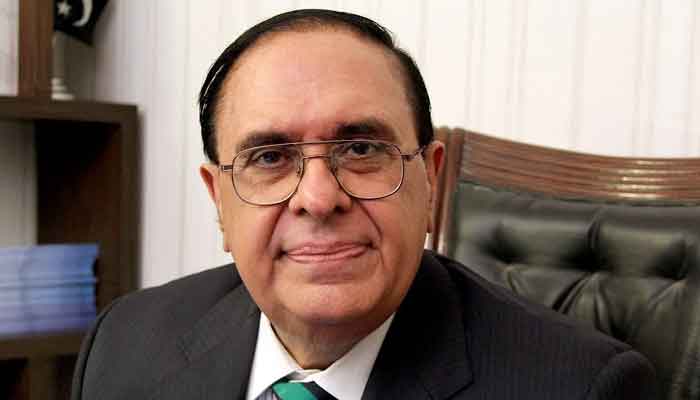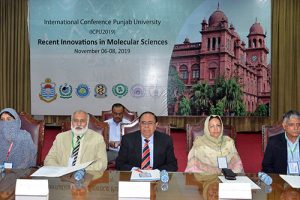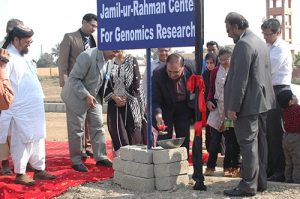
Vice-chairman of the Prime Minister’s
Task Force on Science & Technology
Dr. Atta-ur-Rahman is one of Pakistan’s best-known scientists and educationists. Currently, he is serving as Chairman of the Prime Minister’s Task Force on Science & Technology and Vice Chairman of the Knowledge Economy Task Force which is Chaired by the PM himself. Dr Rahman is a patron of the International Center for Chemical and Biological Sciences (ICCBS) – one of the premier research establishments in the developing world. The HEJ Research Institute of Chemistry, University of Karachi, is also part of the ICCBS.
During his long and distinguished career as a scientist, researcher and educationist spanning well over five decades, Dr. Rahman has served in a number of important positions, including as federal minister for science and technology and chairman of the Higher Education Commission. He has written around 825 research papers and 380 books, and has 50 international patents to his name.
He has received numerous national and international awards including Nishan-e-Imtiaz, Sitara-e-Imtiaz, Hilal-e-Imtiaz and Tamgha-e-Imtiaz.
In his wide-ranging interview with Narratives Media – this publication’s YouTube Channel – Dr. Rahman talks about the knowledge economy and why it is so important for Pakistan in a rapidly changing world. Excerpts from the interview…
We often talk about the knowledge economy. How would you explain it?
Today’s world is the world of knowledge. In today’s world, human resources are more important than natural resources. What [kind of] education have we imparted to our children? How have we helped with the progression of their minds? Have we roused their creativity so that they can develop, create new products, processes and knowledge? These are vital questions.
In the past, a majority of the economies relied on natural resources. But today, almost 75 per cent of the world’s biggest companies — the top 20 — are information technology companies. None of them exploit natural resources to make money, but create wealth by using the mind… A big revolution is around the corner and the world will change in the next 10-15 years. Electric cars will replace the current ones… New technologies have been developed, which will change the genetic structure… they would make it possible to use seawater (commercially) to grow fruits, vegetables and other crops. All these developments are part of the knowledge economy. Stem cells, regenerative medicines… it is being said that children that are being born today will live for 150 years or more because anti-aging compounds are being developed.
Pakistan’s problem is that 60 per cent of our exports comprise low-value textiles. While the world is investing in high-level technologies and on value-addition, our high-value exports are less than one per cent (of the total).
It appears that the future world will be more complicated. Where does Pakistan stand?
Pakistan, a country of 220 million people, is rich in natural resources and has a huge demographic advantage; 67 per cent of Pakistan’s population is below the age of 30 years, yet our exports hover around 25 billion or so. In comparison, a small country like Singapore, with a population of just 5.5 million — one-fourth of Karachi’s — has 330 billion dollars’ worth of exports. Singapore has no natural resources… (but) Lee Kuan Yew, a single man, said that Singapore’s real wealth were its children. He fixed the education system, focused on science and technology… (Encouraged) innovation and entrepreneurship. And we can see the results.
Knowledge economy has been a buzzword since Musharraf’s era, so why hasn’t there been any development on this front?
In 2002, the HEC (Higher Education Commission) rolled out big programmes to push Pakistan towards knowledge economy. Within six years, four Pakistani universities ranked among the world’s Top 500 and our research publications grew rapidly. But after that, the HEC did not receive support… today none of our universities figure in the Top 500 list. Successive governments paid only lip service to this cause and didn’t invest in higher education, even though our example was copied by India. On July 22, 2006, the then Indian prime minister and the cabinet were given a presentation about my work and the HEC… they decided to follow in the HEC’s footsteps. In 2019, India made an institution modelled after the HEC, and named it HECI (Higher Education Commission of India). So, India is copying us, while we have abandoned our programmes.

Is it a problem of resources, political will or priorities?
Our country has a feudal system in which education, science and technology aren’t encouraged. The feudal elite doesn’t want the common people to rise to the level of their “masters.” In India, the feudal system was broken by Nehru soon after independence. India introduced land reforms, and this also happened in Bangladesh. Now both India and Bangladesh are ahead of Pakistan.
We have spent only around 2.5 per cent of the budget on education… 20 million children are out of school. The budget for higher education in 2017-18 was 109 billion rupees, and now it’s only 13 billion. What should have doubled within five years, has decreased instead. But now Prime Minister Imran Khan has established a Knowledge Economy Task Force, and he is its chairman, while I am the vice-chairman and five to six federal ministers are members, including the ministers of finance, planning, education, science and technology… Projects worth 120 billion rupees have been approved by the task force or are in the pipeline.
Has the 18th Amendment stymied efforts to promote higher education because the subject has been handed over to the provinces?
It is a misunderstanding that after the 18th Amendment, higher education has gone to the provinces… The Supreme Court, in response to my 2010 petition, has already given its verdict that higher education remains a federal subject and can only be changed through a new law… [Yet], in the last 15 years, successive governments have ignored higher education.
It is interesting to know that India followed Pakistan’s HEC example. But where do we stand in the region now?
There are both pluses and minuses… The pluses first: we have sent thousands of students abroad, who have come back with PhDs from top universities, improving both our research and teaching. Actually, top universities aren’t the name of beautiful buildings, but of beautiful minds — of the faculty. If the faculty isn’t good, you can’t improve standards…
We also started the world’s biggest Fulbright programme. Our students went to Germany, France, Italy, Sweden, Austria, Japan etc. and all returned because we increased the wages and research grants for the universities. We also established a digital library, in which 35,000 books and 25,000 journals are available. There was around a 98 per cent return rate of students from abroad…
When I left (the HEC) in 2008, we had sent around 1,100 students abroad in a year, but now these numbers have drastically dropped.
Currently… for every 100 students, there is only one PhD teacher, while this ratio should be 20:1 or 10:1. We should have picked 70,000 MSc students, and sent them to foreign universities… But now 200-300 students are being sent, compared to 1,100 students a year during my tenure in the HEC. Last year, 250 students went, and before that only 40.
Can the private sector play a role in promoting higher education or is it solely the government’s responsibility?
The private sector has an important role to play… When I was the federal minister of science, and HEC chairman, I got a decision approved by the cabinet that development projects should also be given to private sector universities. I got the first project of around 1.5 billion rupees approved for the LUMS’ engineering faculty. Then, 12 not-for-profit universities were shortlisted for the submission of development projects… But the HEC chairman, who came after me, did not support this initiative. I hope the new HEC chairman revives this programme.
The public sector has its constraints. It has fewer funds, but are you satisfied with the teaching standards in the private sector universities?
We have some good universities… We should identify each one of them to give research grants, student scholarships, faculty training and development programmes so that they can achieve centres of excellence status… But we must ensure that fees for the private sector universities remain affordable. A poor man’s child should be given the same opportunities as that of a rich man.
On a different note, what are the disciplines of 21st Century education?
First of all, let’s take agriculture. All the plants you see today are a result of millions of years of evolution… the plants you see today will be different in a few thousand years. However, now a new technique has been developed in laboratories… called CRISPR, which genetically changes the properties of an organism. The evolution, which used to happen in millions of years, now occurs in one to two weeks through genetic manipulation.
On the other hand, AI (Artificial Intelligence) is taking over all sectors. In tomorrow’s workforce, there will be fewer humans and more robots and automations. In the medical world, blind people can now see with (sensors on) their tongues instead of eyes. How? A company in America, Wicab in Wisconsin, has invented an aid, allowing a blind person to see by putting a camera on their face that captures an image and transfers it to a lollipop-like device on the tongue, sending signals to the brain and restoring partial image. This is now commercially available.
As I mentioned earlier, regenerative medicine, which slows down the aging process, is in the making. Such substances have also been discovered, which can reverse the aging process.
Similarly, the (new) energy storage system, next generation genomics, industrial biotechnology — all these are the result of the knowledge economy. You must have heard those classic stories in which a person throws a cloak on himself and becomes invisible. Now such materials are being developed. They are known as meta-materials. Wearing a cloak made out of this material will make one invisible as the light will deflect, and instead fall on the object behind you. Meta-materials are now being used commercially to develop stealth submarines, aircraft and tanks etc. A material, graphene, has been developed using pure carbon, which is 200 times stronger than steel. In every field, mind-boggling developments are taking place.

You said that in the coming years, there will be more robots at work than humans. What will humans do? Will the uneducated have a place in the new world?
Everyone will need to be educated. A chip will be installed in the brain, having all the relevant knowledge… human beings of the future will be a different kind of humans… The chip that I am talking about has already been developed.
Sounds like a scary scenario, where the developed world will have a huge advantage… and those from the backward nations will be reduced to a subhuman level compared to the genetically and AI-modified and enhanced humans.
It is a big threat. This technology has now divided the world, and the difference between the advanced and backward humans will only grow. The difference between a poor and rich country has drastically increased in the last 200 years. Technology has become the big divider…. We need to cross the wall, if we want to stay alive. To cross this wall, we need to invest in the country’s true wealth — human resources.
Does this mean that disciplines like literature, art, philosophy and other social sciences will have no place in the future world?
These subjects are of the utmost importance. Shakespeare spoke of “the milk of human kindness.” If a person’s spiritual needs are not fulfilled, he cannot progress… It’s important that we do not ignore social sciences and humanities. They are fundamental to our lives. We have to invest in our education and include personality development, communication and problem-solving skills in it. There is a big problem with our examination system. Students should give open-book exams. The questions should be such that only if you have understood the subject, can you give the answers. Rote learning is like a poison for education….
What should be our priorities?
The Knowledge Economy Task Force has set five priorities:
- Agriculture, to overcome rural poverty. Strengthening and boosting agriculture will have the quickest impact.
- Investing in information technology, artificial intelligence, blockchain technologies etc. For these technologies, you don’t need to set up huge factories. Just a classroom and a good teacher will suffice. We have smart children, who top in O- and A-level examinations worldwide. We just need to teach.
- Focusing on new and emerging technologies.
- Extracting, developing and exporting mineral resources, which are abundant in Balochistan and Khyber Pakhtunkhawa.
- Blended education. In today’s world you can study IT, attend Stanford or Harvard without leaving this country, through the computer. Therefore, the task force has approved a project worth billions of rupees to develop a virtual university for quality teaching. We also need to focus on policies and ensure ease of doing business. Pakistan’s world ranking is weak. In Singapore, you can open a new business within 24 hours. Here, you have to waste six to 10 months…. Then, do we have a valid policy for IT, which gives clear information on what must be done, when it will be done, who will do it, at what cost? The answer is, no.
Creating a knowledge-based economy is not just the job of a single ministry. Take the duties structure. Currently, our duties structure encourages import of computers at lower rates rather than its parts, on which higher duties are slapped. This policy doesn’t make sense. The whole system appears to be designed to discourage manufacturing and prevent us from following in the footsteps of Korea or Singapore… we will always have a beggar’s bowl in our hand, asking someone to give us computers, give us vaccines.
Speaking of the Covid vaccine, the biggest manufacturer of the vaccine in the world is India. In Pakistan, forget the COVID-19 vaccine, we can’t even make an ordinary vaccine… we need to evolve and change and PM Imran Khan is focusing on this. That’s the reason for the 600 per cent increase in the development budget of the ministry of science and technology this year. A silent revolution is coming, but we need to remain consistent with our policies.

The writer is a senior journalist and managing editor, Narratives.



